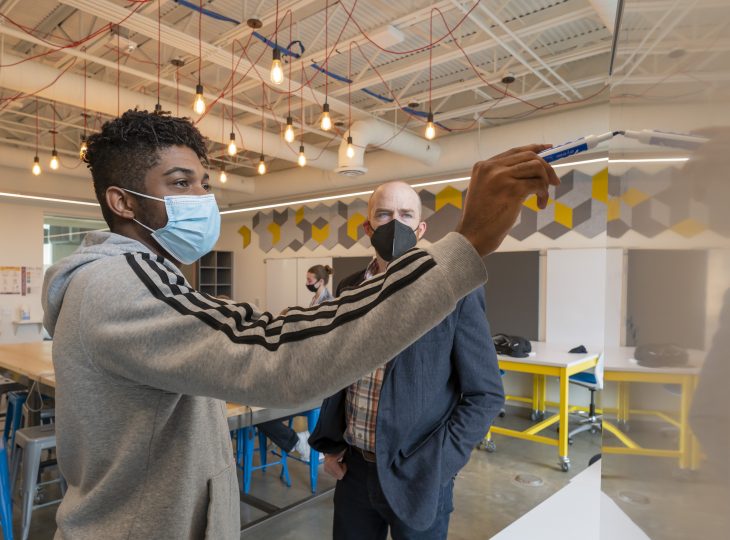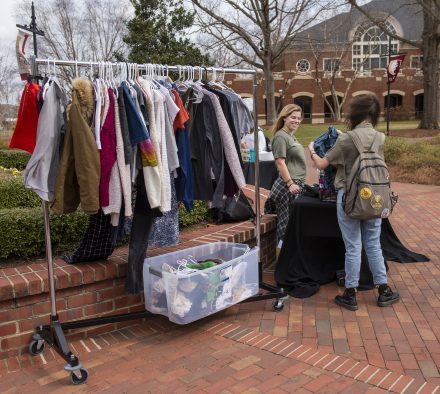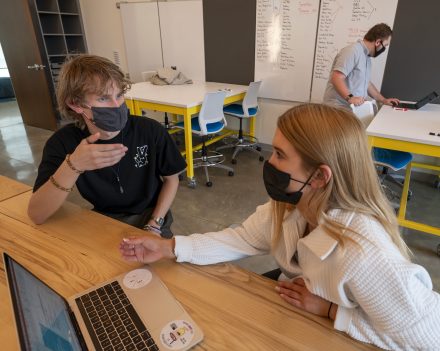Associate Professor of Entrepreneurship Sean McMahon helps students grow their business ideas from concept to reality.

During a November afternoon in a Sankey Hall classroom, Aidan Burnside ’22 sketched out circuitry on a whiteboard while across the room, Kobie Williams ’22 commandeered another whiteboard to map out a decision-making flow for his nascent mobile application. Elsewhere, Ben House ’23, Leah Schultz ’23 and Grace Wainwright ’23 gathered around a laptop as they poured over their latest additions to a website for Century Orchard, an area seller of heritage and disease-resistant pear trees. Sophie DeJong ’22 took a break from her work on her business, Cape Cod Naturals, to turn around and offer feedback to the trio.
Bouncing between students and groups was Associate Professor of Entrepreneurship Sean McMahon, pulling up a chair to offer constructive feedback and probing questions for the dozen students in his class, Design Thinking for Action, which serves as an incubator for ideas, businesses and inventions. McMahon can be deep in discussion with one student when another overhears their conversation and pops by to offer some insight or pose a question.
It’s an innovative and free-flowing approach to teaching these students how to navigate a startup business from a spark of an idea to actually connecting their services or products with potential customers. Throughout a single class period, the students and McMahon can come together to work on something as a group, dissolve into small groups or individuals to work on their own projects, and then reform into multiple collaborative pods to bounce ideas off each other. “We all talk about our businesses with each other,” says DeJong, whose Cape Cod Naturals offers candles for sale on Etsy and other online retail sites. “It’s like an open book. It’s really motivating to be around everyone who is doing their own thing.”
McMahon is there to coax them along and offer lessons learned from his own time as an entrepreneur and within academia as they move their business ideas from concept to reality. “For me, it’s straight-up heaven,” he says of the experience of working with the students and seeing how they work with and guide each other. “All these students have really owned the nature of this course.”
Fall 2021 was the third time the course was offered by McMahon, who designed and launched the entrepreneurship major and minor at Elon in 2014. Typically filled with juniors or seniors, the course is designed to be an incubator where students can take what they’ve learned in other courses and combine them with a business idea to see what can happen when they dedicate the time and energy toward moving it forward in a collaborative way. Each submits an idea with their application to participate in the class, with McMahon choosing about a dozen students to enroll.
“The entrepreneurial ecosystem here at Elon is really taking shape,” McMahon says. “Within that, there should also be some core for the people who might launch the next Tesla. This class tries to be a proxy for that little core of those in this area who are actually working on a project.”

Burnside, who is double majoring in engineering and entrepreneurship, used the class to propel forward his idea for a lightbulb that can seamlessly switch from LED to UV, giving it the capability to kill viruses and bacteria. The idea stemmed from discussions with his father, who is in the medical field, during the early days of the pandemic about how hospitals and other health care environments use UV light to disinfect. “I want to design a way to be able to use UV to disinfect that’s cheaper, less invasive and less time-intensive,” Burnside says.
Burnside has been focused on learning about intellectual property rights as his bulb is taking shape and is also leaning on other class members for assistance. Lending a hand with coding the firmware for the lightbulb are Williams and Jakob Reuter ’23, who with Grace Granger ’22 is running U Thrift, a company that resells clothing and other items for students. “We have a lot of accountability with the other students in the class,” Burnside says.
Williams is building an app that taps into crowdsourcing to identify whether study spots on Elon’s campus are available. The app seeks to process student-reported data about whether locations are vacant and leverage machine-learning to predict when certain spots may be available for use. “Being around people who are working on their own things and being a fly on the wall for these conversations about business is so helpful,” Williams says. “I have learned to explore new areas I haven’t thought about before.”
Every other week, each class member presents their progress on their business idea to the group, as if their fellow students are shareholders. They talk about goals and accomplishments, then field challenging questions from their classmates.
“That keeps us motivated and on track because there are multiple people holding us accountable,” says Wainwright, whose team is advancing Century Orchard’s online retail and marketing efforts.
“These students may or may not make a career out of these startup projects, but their experience in this class is definitely going to inform what they do next,” McMahon says. “The initiative they took and the exposure they received are going to be hugely important for their next steps, and the way they view themselves actualizing ideas.”
Wainwright, Schultz and House didn’t come into the class with an idea to pursue, but instead opted to explore how to help an existing business scale and innovate. Century Orchard was moving from handling all its orders by phone or email to creating e-commerce options.
The supportive and collaborative class environment McMahon creates is particularly appealing to Schultz. “I like that it’s not just me pursuing an idea by myself in here,” Schultz says. “It’s a bunch of people with different projects, so we can all learn from each other and from Dr. McMahon.”
In working with his students, McMahon carefully resists the urge to be a naysayer, even when he sees students wanting to pursue ideas that others have attempted and failed previously. It’s an approach that keeps him from being written off as out-of-touch by a young mind looking to try a fresh approach and is also one that demonstrates the value in learning even through failure. He often talks about “keeping the porch light on,” meaning that even the most far-fetched idea might gain traction and succeed.

DeJong thinks it’s unlikely that her career path will lead her to producing and selling candles on a large scale, but Cape Cod Naturals has provided her the experience of running her own business while gaining insight into how to navigate real-world challenges during the pandemic, such as supply chain issues. “I came in knowing that I wanted to work on my marketing,” DeJong says. “I knew I wanted to put my effort into that, as well as working on my self-discipline and time management.”
McMahon can rattle off the statistics — that each year only about three out of every 1,000 college graduates will found a startup. For those who do launch new companies, the average age is about 40, so the image of the self-made millionaire is not of the recent college grad, but someone who may have a few (or many) gray hairs.
But when he arrives at class to find one student in the hallway talking to a client, with two students working on different projects collaborating and trading ideas on the whiteboard, and another sending a text message about being late to class because they are working on product inventory, he can’t help but be excited by all they are learning, and how it will shape their future careers and lives.
“These students may or may not make a career out of these startup projects, but their experience in this class is definitely going to inform what they do next,” McMahon says. “The initiative they took and the exposure they received are going to be hugely important for their next steps, and the way they view themselves actualizing ideas.”


